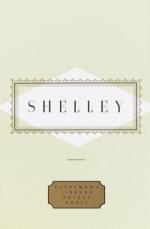(512 Vox populi, vox dei. As Mr. Godwin truly observes of a more famous saying, of some merit as a popular maxim, but totally destitute of philosophical accuracy.—[SHELLEY’S NOTE.])
(534 Quasi, Qui valet verba:—i.e. all the words which have been, are, or may be expended by, for, against, with, or on him. A sufficient proof of the utility of this history. Peter’s progenitor who selected this name seems to have possessed A PURE ANTICIPATED COGNITION of the nature and modesty of this ornament of his posterity.—[SHELLEY’S NOTE.])
602-3 See Editor’s Note.
(583 A famous river in the new Atlantis of the Dynastophylic Pantisocratists.—[SHELLEY’S NOTE.])
(588 See the description of the beautiful colours produced during the agonizing death of a number of trout, in the fourth part of a long poem in blank verse, published within a few years. ["The Excursion”, 8 2 568-71.—Ed.] That poem contains curious evidence of the gradual hardening of a strong but circumscribed sensibility, of the perversion of a penetrating but panic-stricken understanding. The author might have derived a lesson which he had probably forgotten from these sweet and sublime verses:—
’This lesson, Shepherd, let us two divide,
Taught both by what she (Nature) shows and what conceals,
Never to blend our pleasure or our pride
With sorrow of the meanest thing that feels.’—[SHELLEY’S
NOTE.])
(652 It is curious to observe how often extremes meet. Cobbett and Peter use the same language for a different purpose: Peter is indeed a sort of metrical Cobbett. Cobbett is, however, more mischievous than Peter, because he pollutes a holy and how unconquerable cause with the principles of legitimate murder; whilst the other only makes a bad one ridiculous and odious.
If either Peter or Cobbett should see this note, each will feel more indignation at being compared to the other than at any censure implied in the moral perversion laid to their charge.—[SHELLEY’S NOTE.])
NOTE ON PETER BELL THE THIRD, BY MRS. SHELLEY.
In this new edition I have added “Peter Bell the Third”. A critique on Wordsworth’s “Peter Bell” reached us at Leghorn, which amused Shelley exceedingly, and suggested this poem.
I need scarcely observe that nothing personal to the author of “Peter Bell” is intended in this poem. No man ever admired Wordsworth’s poetry more;—he read it perpetually, and taught others to appreciate its beauties. This poem is, like all others written by Shelley, ideal. He conceived the idealism of a poet—a man of lofty and creative genius—quitting the glorious calling of discovering and announcing the beautiful and good, to support and propagate ignorant prejudices and pernicious errors; imparting to the unenlightened, not that ardour for truth and spirit of toleration which Shelley looked on as the sources




